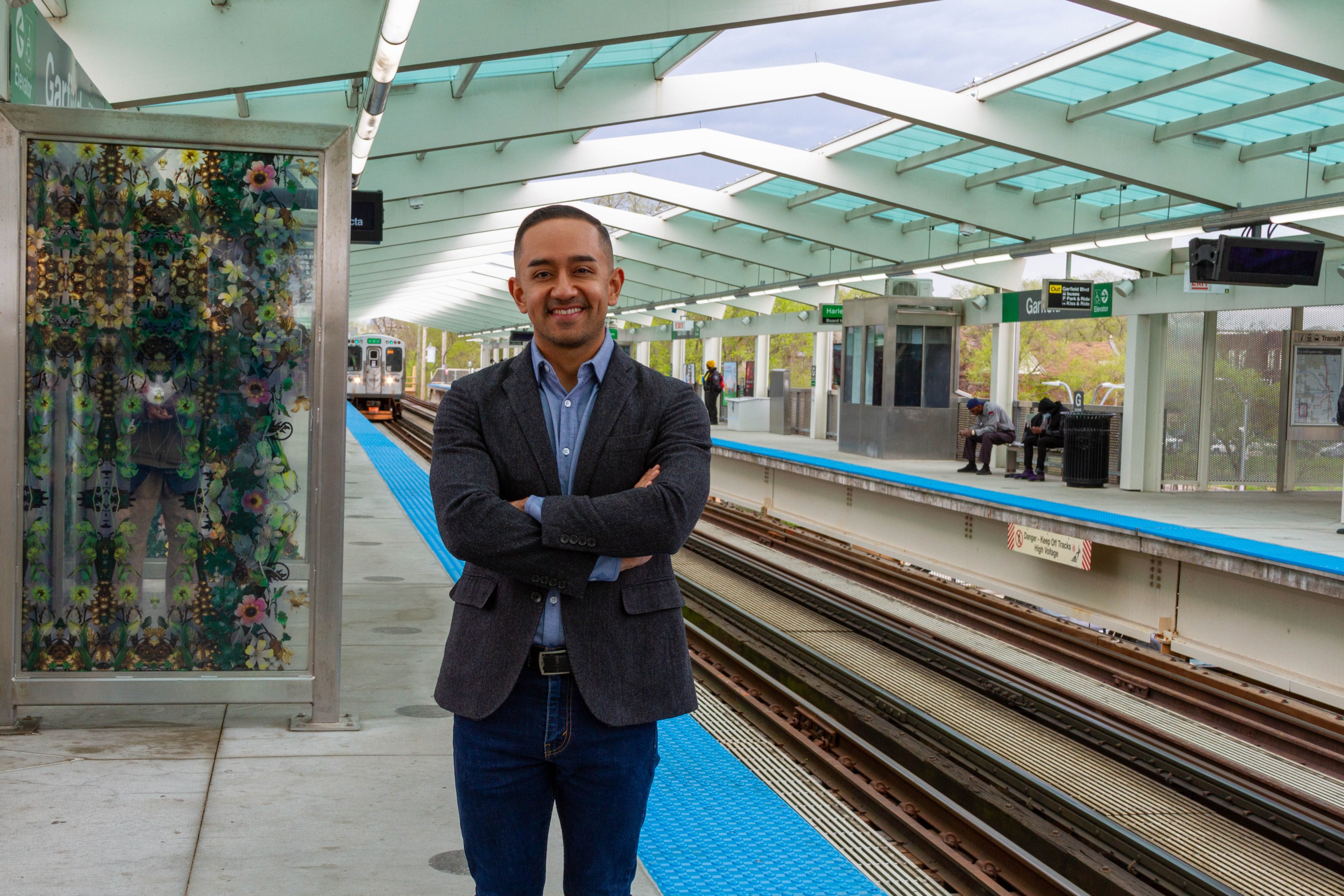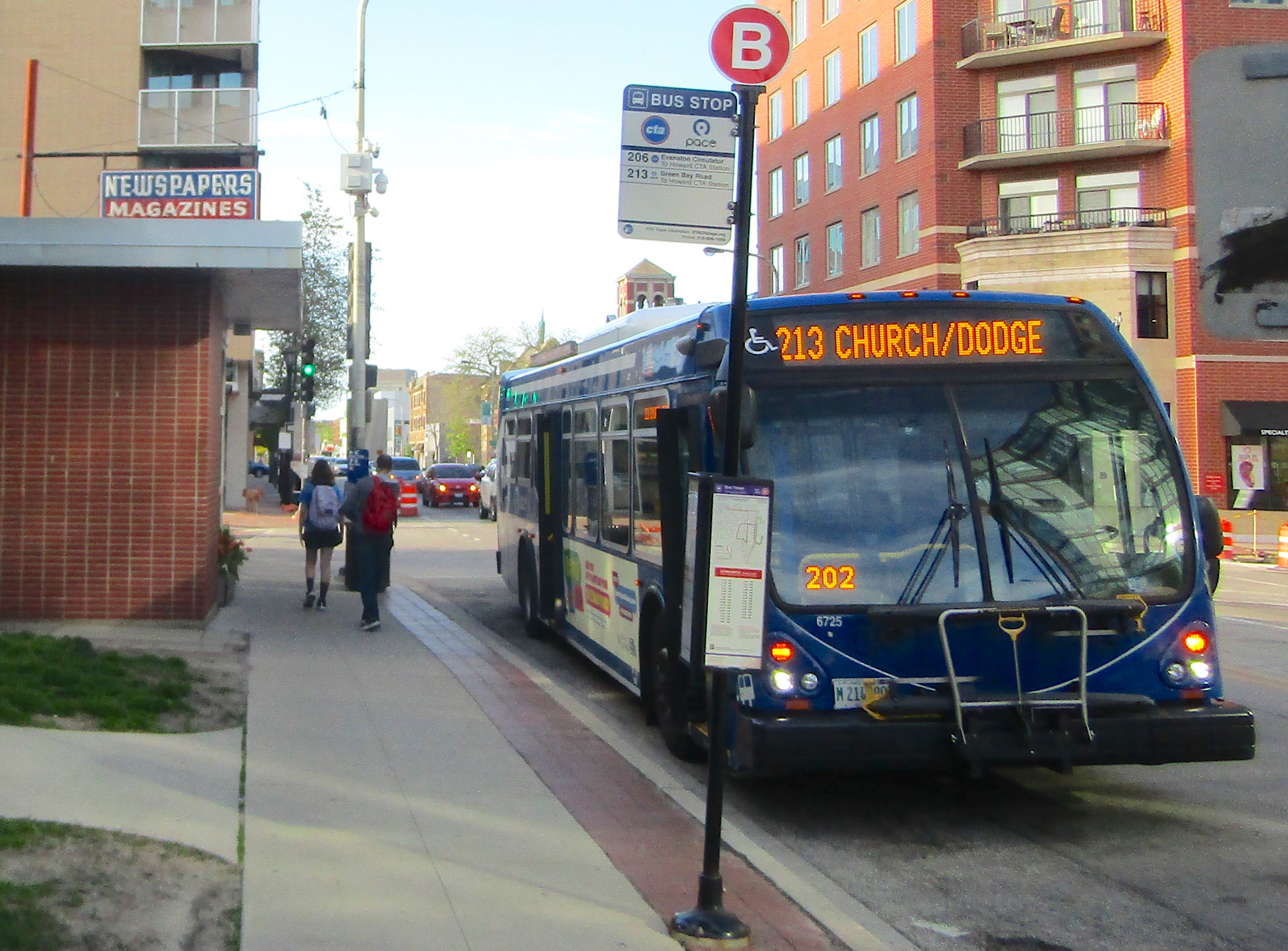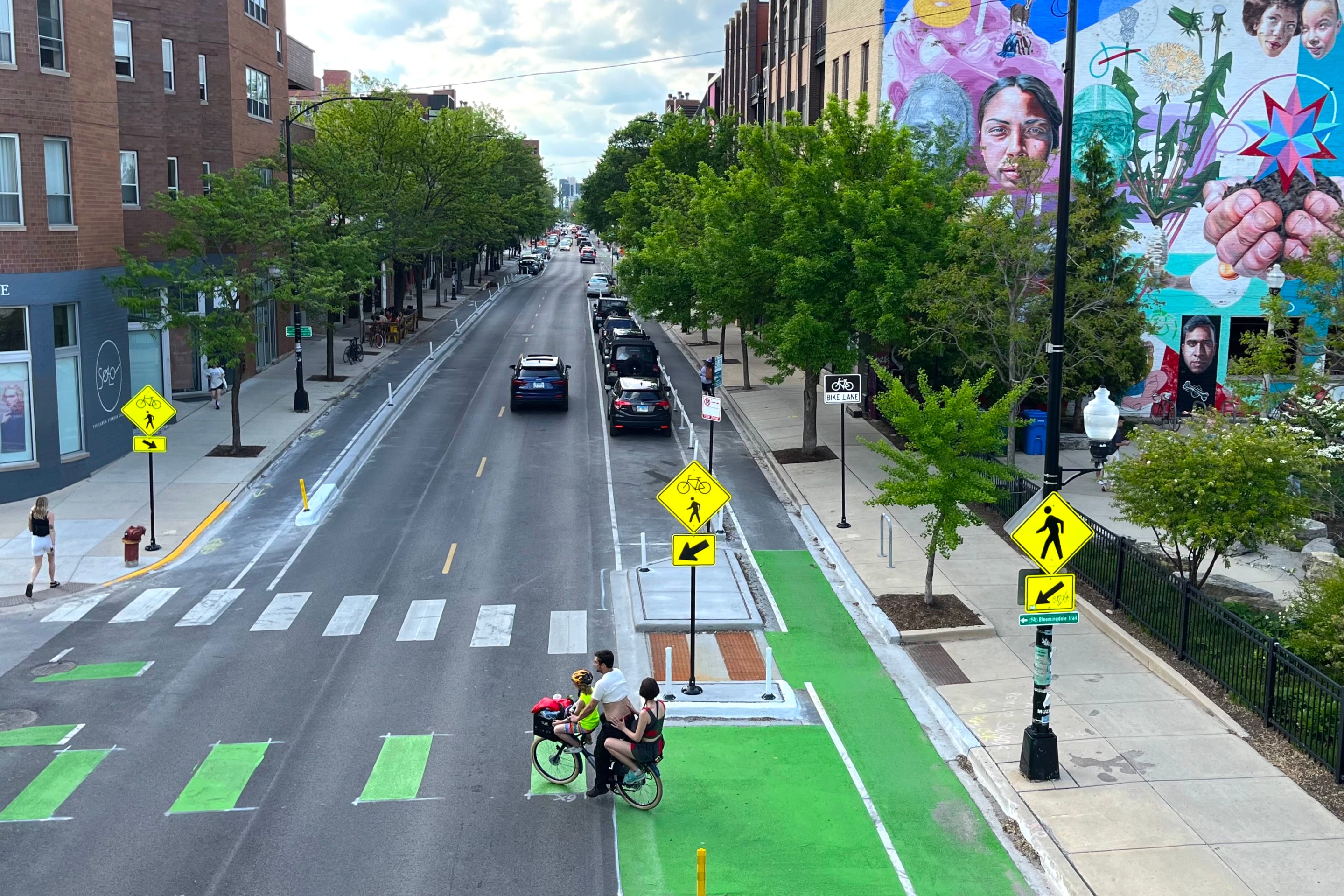Meet the Anti-Union Libertarian Star Trying to Kill the Logan Square Affordable TOD Plan
2:43 AM CDT on April 30, 2019
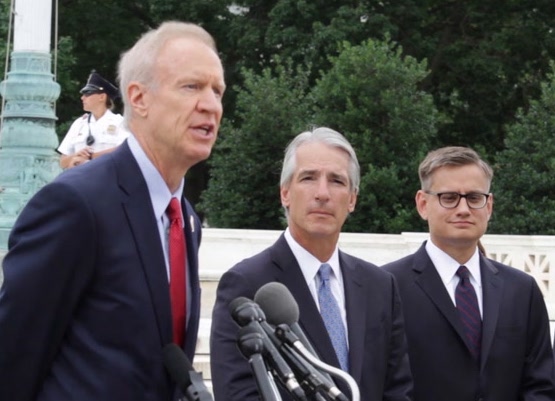
Bruce Rauner, Illinois Policy Institute CEO John Tillman, and then-IPI attorney and current TOD plan opponent Jacob Huebert, celebrating the anti-union Janus decision on the steps of the U.S. Supreme Court. Image: Chicago Sun-Times
Members of Logan Square Neighbors for Responsible Development, a group made up of real estate brokers, landlords, attorneys, architects, and other folks who live near the neighborhood's Emmett Street parking lot, have cited many reasons for their opposition to current plans for an all-affordable 100-unit transit-oriented development on the the lot, located next to the Logan Square Blue Line station.
They're argued that the seven-story building would be too tall; that it wouldn't include enough open space (although a new plaza is planned across the street); that the 20 on-site parking spots will be insufficient (although a parking study found that the lot is typically 70 percent empty); and that there hasn't been a sufficient opportunity for public input (although the community input process began five years ago.)

But one astute observer noticed that there's another reason why at least one LSNRD member may oppose the affordable TOD plan: philosophical opposition to publicly funded housing for low-income and working-class people.
The Logan project is projected to cost about $31 million, and nonprofit developer Bickerdike redevelopment hopes to line up the financing by using subsidies like low-income tax credits and tax-increment financing money. As Twitter user @cholent_lover (and, really, who doesn't love cholent?) pointed out, one of the opponents who testified against the plan at last Thursday's packed community meeting is libertarian attorney Jacob Huebert, famous in anti-organized-labor circles for winning a recent anti-union lawsuit in the U.S. Supreme Court.
So one of the anti-affordable housing speakers from tonight’s meeting on the #EmmettStreet development also happens to have been lawyer to Mark Janus in the Janus vs AFCSME Supreme Court case. His wife Allison was the one who wouldn’t give the mic back. pic.twitter.com/zhL5KekYqx
— Albany Park Blaine (@cholent_lover) April 25, 2019
Huebert lives on Emmett Street near the lot with his wife, attorney Allison Huebert, an LSNRD leader who also spoke at Thursday's hearing and did, in fact, refuse to give up the microphone after allotted time ran out.
Nowadays conservative libertarians like Jacob Huebert (more on that in a bit) tend to advocate for minimal government intervention, laissez-faire capitalism, low-taxes, and strong private property rights. All of that would seem to run counter to the idea of using taxpayer money to build 100 units of affordable housing on land that many for-profit developers would love to build on, across the street from private homeowners who don't want them there.
LSNRD members have repeatedly claimed that they're not against affordable housing, but by calling for less height, more parking, and more open space on the site, in effect they're pushing for far fewer units. They're also advocating for the community input period to be extended by several months, which TOD proponents at the meeting argued could jeopardize the project. (At Thursday's meeting, multiple LSNRD leaders declined to talk with me and stated or indicated that group members would not do interviews with Streetsblog Chicago in the future.)
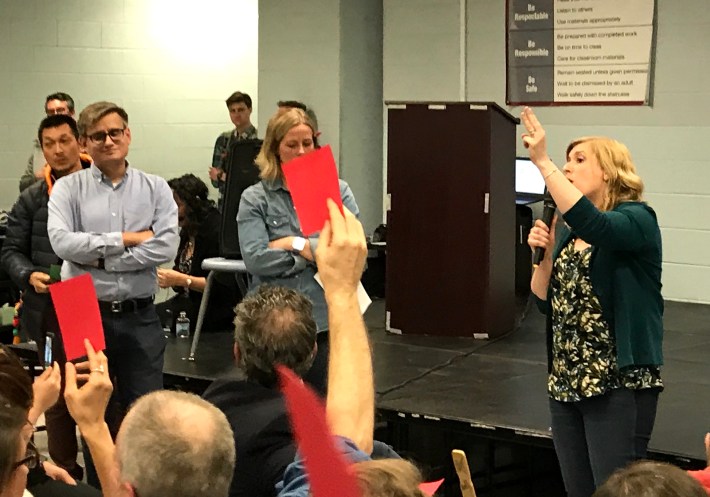
In fairness, without being a mindreader it's impossible to know for sure what Jacob Huebert's true motivations are for opposing current plans for a project that will fight displacement and improve transit access for working people. But it's interesting to consider this stance in light of his professional history.
Huebert is currently a senior attorney at the Goldwater Institute, a conservative and libertarian think tank based in Phoenix, named after the late Arizona Senator Barry Goldwater. The Republican senator famously lost the 1964 presidential election to Lyndon B. Johnson in a landslide, four months after Goldwater voted against the Civil Rights Act of 1964, which outlawed discrimination based on race, color, religion, sex, or national origin. He lost the electoral vote in all states except Arizona and the Deep South.
Huebert is also the author of the book Libertarianism Today, and he and his writings have appeared in many national news outlets, including the Wall Street Journal, the New York Times, and, of course, Fox News.
Previously Huebert worked as director of litigation at the Liberty Justice Center, the "free-market public-interest litigation center" of the right-wing Illinois Policy Institute, which was closely aligned with former Republican Illinois governor Bruce Rauner during his first few years in office, although that relationship eventually deteriorated. Huebert's successfully litigation of the Janus v. AFSCME anti-union case is his biggest claim to fame.
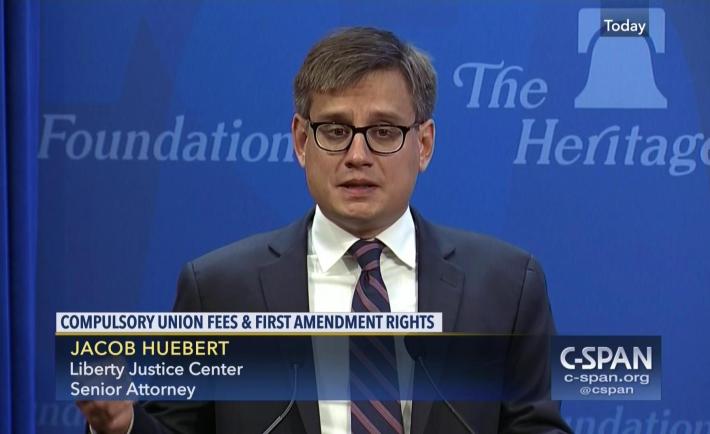
That case was a major financial blow to labor unions, with the Supreme Court ruling that workers can't be required to pay fees to the unions that represent them in collective bargaining, which Huebert argued was a First Amendment rights issue. Rauner originally filed the suit in early 2015, shortly after taking office, with the goal of watering down the political power of Democratic unions, but a lower court judge ruled that he didn't have the standing to bring the case. Instead Mark Janus, a state child support specialist, was named as the lead plaintiff against the American Federation of State, County and Municipal Employees, the union that represented him.
The Supreme Court decided the case in Janus' favor in June 2018. The deciding vote was cast by Neil Gorsuch, whom Donald Trump appointed to the court after Senate Republicans had refused to hold a hearing or vote on Barack Obama's nominee for the seat, Merrick Garland. Ironically, Huebert lauded the Janus decision, which weakened the ability of unions to advocate for working people, as "the biggest victory for workers’ rights in a generation." Here's what Trump had to say about the win:
Supreme Court rules in favor of non-union workers who are now, as an example, able to support a candidate of his or her choice without having those who control the Union deciding for them. Big loss for the coffers of the Democrats!
— Donald J. Trump (@realDonaldTrump) June 27, 2018
Let's pan back from Washington, D.C. to Logan Square again. At Thursday's community meeting Jacob Huebert stated his case, not on an issue of nationwide importance, but one that is taking place almost literally in his backyard.
During the public comment period, Huebert was preceded by his wife Allison. She argued that the proposed affordable development did not reflect what community members said they wanted at the Emmett site during 2014 brainstorming workshops conducted by the Metropolitan Planning Council, which she attended. "We wanted affordable housing that would address displacement for Logan Square residents," she said. "This housing will not help Logan Square residents. This is going to everyone that will show up." During Thursday's hearing Bickerdike CEO Joy Aruguete stated that marketing for the new TOD would be focused in the Logan Square area.
As @cholent_lover mentioned, partway through Allison Huebert's speech the timer went off and local alderman Carlos Ramirez-Rosa reached for the microphone to give it to the next speaker, LSNRD member Sarah Maxwell, but Allison Huebert refused to surrender the floor. Supposedly Maxwell gave her time to Huebert, but Maxwell wound up speaking as well.
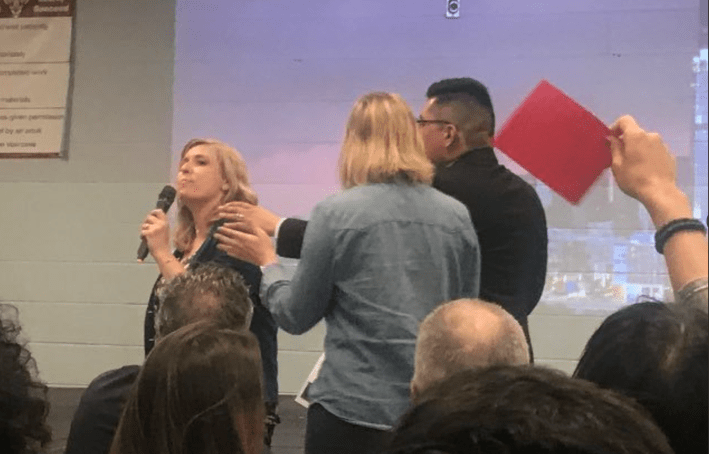
After Maxwell said her piece, Jacob Huebert took the microphone and spent his time railing against the public input process for the TOD. "Let’s recognize that this is not a real community discussion about what’s best for the community," he said. "Let’s recognize that this is not a real community discussion about what’s best for this property... This is a farce."
Funny, that's exactly how many Chicago workers felt when Jacob Huebert's anti-union lawsuit was decided by the judge whom Trump had appointed to a stolen Supreme Court seat.
Correction 4/30/19: This piece previously attributed some comments from the meeting to Allison Huebert, which were actually made by another TOD plan opponent. Apologies for the mix-up.
In addition to editing Streetsblog Chicago, John writes about transportation and other topics for additional local publications. A Chicagoan since 1989, he enjoys exploring the city on foot, bike, bus, and 'L' train.
Read More:
Stay in touch
Sign up for our free newsletter
More from Streetsblog Chicago
Elevated Chicago’s new leader on how to build more support for equitable transit-oriented development
Recently announced as executive director Juan Sebastian Arias also shared his POV on Mayor Johnson's Cut the Tape initiative to speed up the development approval process
Since COVID, Pace ridership has fared better on major corridors and in north, northwest suburbs than in south, west ‘burbs
The suburban bus system's top five busiest routes largely maintained their ridership rankings.
Due to incredible support from readers like you, we’ve surpassed our 2023-24 fundraising goal
Once again, the generosity of walk/bike/transit boosters is fueling our reporting and advocacy.
